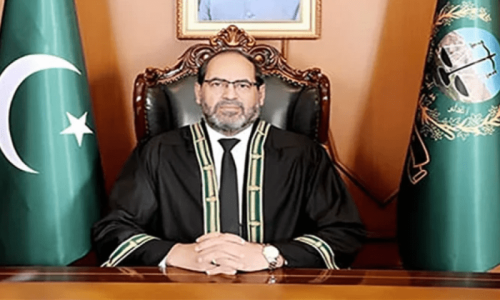RADICALISATION within the ranks of Pakistan's armed forces is an issue of major concern, especially considering that the nation is currently in the midst of quelling a militant insurgency. Hence the arrest of Brig Ali Khan, probably the senior-most army officer taken into custody in nearly a decade for alleged links with extremists, should raise the alarm within the security establishment regarding the penetration of radical groups in the ranks. The army confirmed on Tuesday that the brigadier, posted at GHQ, was picked up for suspected links with Hizb ut-Tahrir. The officer was taken into custody last month; though he was under surveillance for some time, the army swooped in when the frequency of his contacts increased. Although HT has not overtly supported violence and has no ostensible links to Al Qaeda, it does call for the restoration of the caliphate and the overthrow of 'corrupt, pro-West' governments in Muslim lands. It is standard HT practice in Muslim countries to recruit influential citizens, including army officers.
Though the army has said Brig Khan's case was “an exception”, we're not so sure. On Wednesday the DG ISPR confirmed that four army majors were being investigated in the same case. In the past, several serving or former armed forces personnel have reportedly been involved in acts of terrorism. Two army officers were reportedly court-martialled for their HT links in 2010 while a former navy commando was picked up from Lahore for allegedly aiding the PNS Mehran attackers. Several army and air force personnel were also arrested for their reported involvement in the 2003 assassination attempt targeting Gen Pervez Musharraf. So clearly, the forces have a problem with encroaching extremism. Many of the arrested men, mostly serving in the army and air force, had links to extremist Islamist groups.
During Gen Zia's rule, the missionary Tableeghi Jamaat made inroads into the garrisons; back then it was a discipline issue as soldiers would take off on unauthorised preaching missions. Today the problem is much graver, as HT and other extremist groups call for 'loyal' troops and officers to overthrow the high command. It is time for the army to do some serious soul-searching. If a serving brigadier can be co-opted, what is the extent of extremist infiltration in the lower ranks? The high command needs to intelligently counter the rising radical trend. A thorough cleansing is needed. This is undoubtedly a major challenge, as countering religiosity and a jihadi spirit that has been nurtured over decades is not easy. But it is a challenge the army must take up.












































Dear visitor, the comments section is undergoing an overhaul and will return soon.